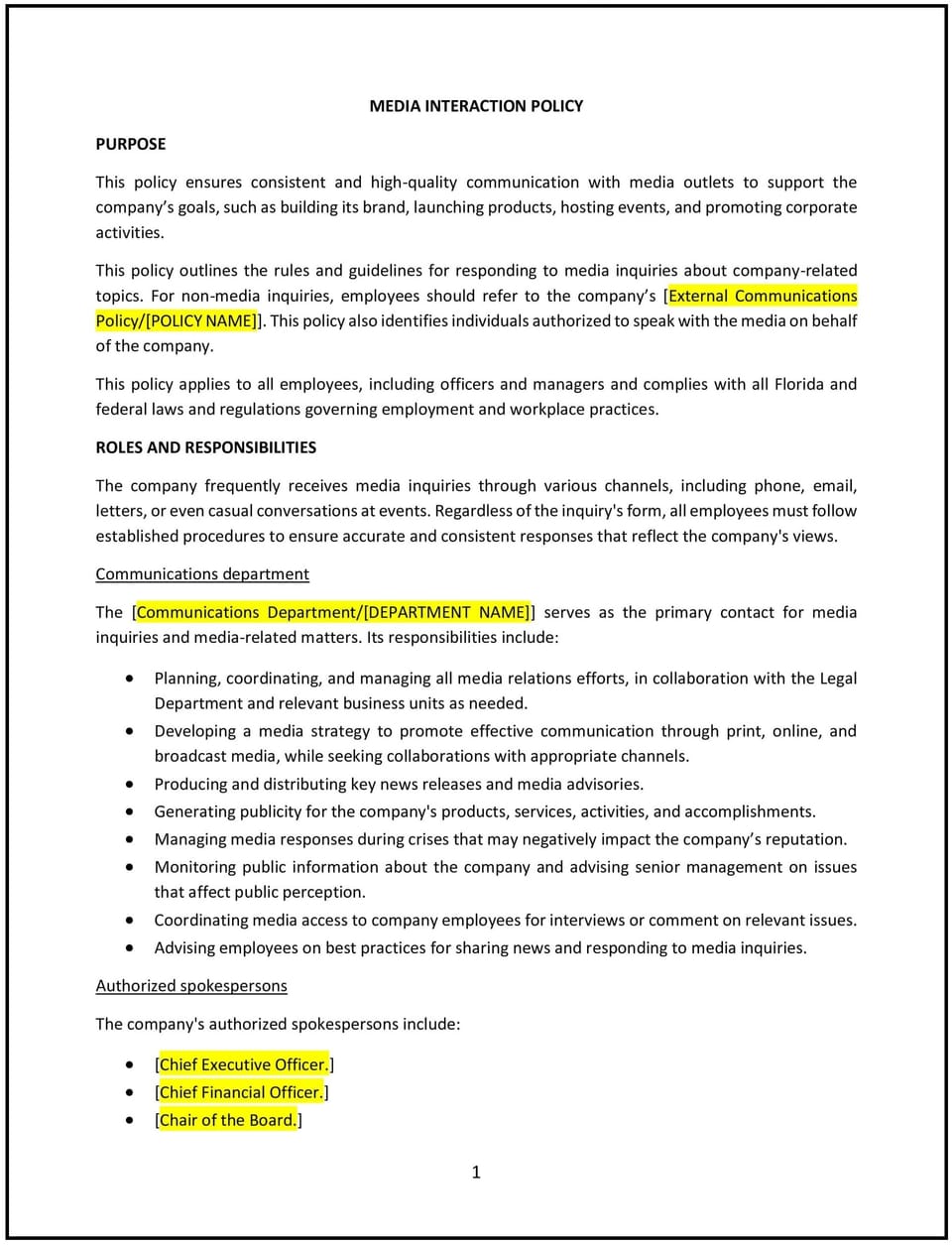Media relations policy (Florida): Free template

Media relations policy (Florida)
A media relations policy helps Florida businesses establish guidelines for interacting with the media in a professional, consistent, and strategic manner. This policy outlines procedures for managing media inquiries, sharing information, and protecting the business’s reputation. It is designed to promote transparency, reduce risks, and provide clear expectations for employees and stakeholders involved in media communications.
By implementing this policy, businesses in Florida can demonstrate their commitment to effective communication, enhance their public image, and align with the state’s focus on fostering trust and credibility with the community.
How to use this media relations policy (Florida)
- Define roles and responsibilities: Clearly specify who is authorized to speak on behalf of the business, such as designated spokespersons or PR teams.
- Establish approval processes: Outline how media statements, press releases, or responses to inquiries should be reviewed and approved before publication.
- Address confidentiality: Explain how sensitive or proprietary information should be handled to avoid unauthorized disclosures.
- Provide training: Educate employees on recognizing media inquiries, understanding the policy, and referring questions to authorized personnel.
- Develop crisis protocols: Specify steps for responding to negative media coverage or public relations crises, including communication strategies and escalation procedures.
- Communicate the policy: Share the policy with employees through handbooks, emails, or training sessions to ensure awareness and understanding.
- Monitor adherence: Regularly review media interactions and address any concerns or discrepancies promptly.
- Update the policy: Periodically assess the policy to reflect changes in media trends, legal standards, or business needs.
Benefits of using this media relations policy (Florida)
This policy offers several advantages for Florida businesses:
- Promotes consistency: Clear guidelines help ensure that all media communications align with the business’s values and messaging.
- Reduces risks: Defined procedures minimize the likelihood of misinformation, unauthorized disclosures, or reputational damage.
- Builds trust: Demonstrates the business’s commitment to transparency and responsible communication.
- Aligns with community values: Reflects Florida’s emphasis on fostering trust, credibility, and positive relationships with the public.
- Enhances reputation: A robust policy showcases the business’s dedication to ethical practices and effective communication.
- Improves decision-making: Helps businesses anticipate potential challenges and incorporate safeguards into media interactions.
- Supports growth: A strong framework for media relations fosters a culture of accountability and adaptability.
Tips for using this media relations policy (Florida)
- Communicate clearly: Ensure employees understand the policy by providing written materials and discussing it during meetings or training sessions.
- Train employees: Educate staff on recognizing media inquiries, understanding confidentiality requirements, and referring questions to authorized personnel.
- Use technology: Leverage tools like media monitoring software to track coverage, analyze trends, and respond promptly to inquiries.
- Stay informed: Keep up with changes in media trends, public relations best practices, or legal considerations that may affect media communications.
- Encourage feedback: Solicit input from employees to identify areas for improvement and ensure the policy meets their needs.
- Review periodically: Assess the policy’s effectiveness and make updates as needed to reflect changes in media dynamics or business goals.
Q: Why should Florida businesses adopt a media relations policy?
A: Businesses should adopt this policy to promote consistency, reduce risks, and demonstrate their commitment to effective and responsible communication with the media.
Q: Who should be authorized to speak on behalf of the business?
A: Businesses should designate specific individuals, such as PR professionals or senior leaders, to serve as official spokespersons and manage media interactions.
Q: What should businesses do if they receive a media inquiry?
A: Businesses should refer inquiries to authorized personnel, ensure responses are accurate and approved, and avoid unauthorized disclosures of sensitive information.
Q: Should businesses prepare for media crises?
A: Businesses should develop crisis protocols, including communication strategies and escalation procedures, to respond effectively to negative media coverage or public relations challenges.
Q: How can businesses monitor their media presence?
A: Businesses should use media monitoring tools to track coverage, analyze sentiment, and identify opportunities to engage with journalists or address inaccuracies.
Q: What should businesses do if inaccurate information is published?
A: Businesses should respond promptly by issuing corrections, clarifications, or statements to address inaccuracies while maintaining professionalism.
Q: How often should businesses review the policy?
A: Businesses should review the policy annually or whenever there are significant changes in media trends, legal standards, or business operations.
This article contains general legal information and does not contain legal advice. Cobrief is not a law firm or a substitute for an attorney or law firm. The law is complex and changes often. For legal advice, please ask a lawyer.


